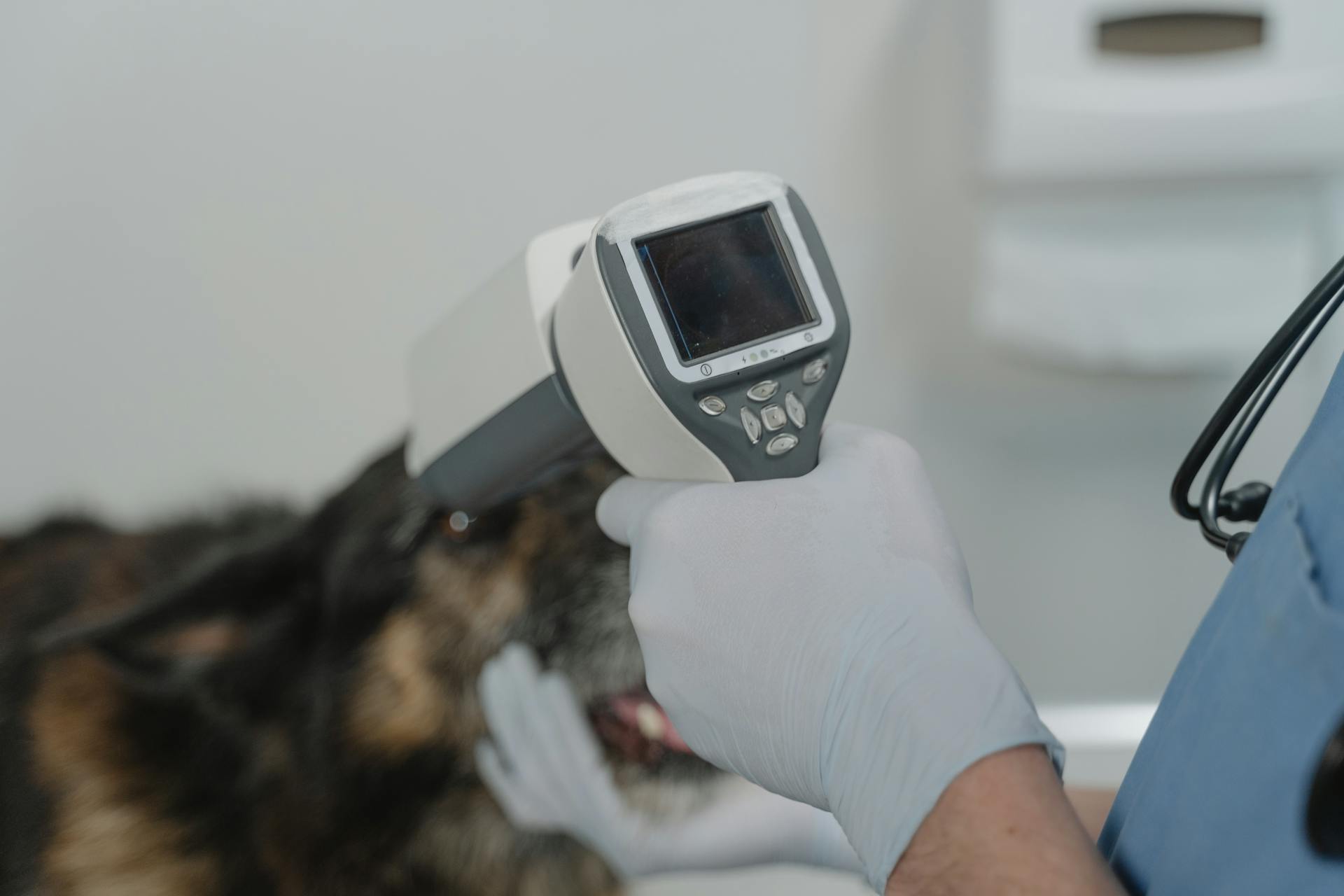
Chihuahuas can be prone to seizures, and it's essential to understand the causes and symptoms to provide the best care for your furry friend.
Chihuahuas are more susceptible to seizures due to their small size and genetic predisposition.
Seizures can be caused by a range of factors, including genetics, brain tumors, infections, and toxins.
A seizure in a Chihuahua can manifest as trembling, drooling, and loss of consciousness.
You might like: Different Types of Dog Seizures
What Are Seizures in Chihuahuas?
Seizures in Chihuahuas are caused by a sudden surge of uncontrollable electrical activity within the brain.
A Chihuahua having a seizure can be a medical emergency, so seek prompt veterinary attention.
Seizures can affect a Chihuahua's ability to sense and respond to the world around them, making them unconscious, "out of it", or anything in between.
Some types of seizures don't affect a Chihuahua's mental status, which makes them difficult to diagnose.
It's easy to mistake muscle tremors or shivering for seizures in Chihuahuas, because they can all involve uncontrollable muscle movements.
If you think your Chihuahua is having a seizure, take a video of the episode and show it to your veterinarian to help with diagnosis.
Causes and Triggers
Seizures in Chihuahuas can be caused by a variety of factors, including epilepsy, which affects between 2% and 5% of dogs.
Epilepsy is a common cause of seizures in dogs, and it's often referred to as idiopathic epilepsy when the underlying cause is unknown.
Some breeds are more prone to developing primary epilepsy, including Schnauzers, Basset Hounds, and German Shepherds.
Chihuahuas may also experience seizures due to heat exhaustion, which can be triggered by hot weather or exercise in hot conditions.
Ingesting toxic substances like chocolate, caffeine, or xylitol can also lead to seizures in Chihuahuas.
A head injury, such as a road accident, can cause seizures in dogs, and Chihuahuas are no exception.
Other potential causes of seizures in Chihuahuas include liver disease, low blood sugar levels, and certain infections like distemper and rabies.
Here are some common causes of seizures in Chihuahuas:
- Epilepsy
- Heat exhaustion
- Head injury
- Ingesting toxic substances
- Liver disease
- Low blood sugar levels
- Distemper and rabies infections
Symptoms and Diagnosis
Symptoms of seizures in Chihuahuas can be tricky to spot, but some common signs include unusual barking, a dazed look, staring into space, twitching, drooling, chomping, stumbling, falling, and foaming at the mouth.
During a seizure, your Chihuahua may also exhibit paddling motions with their legs, uncontrollable peeing or pooping, and loss of consciousness.
Some Chihuahuas may seem nervous and restless before a seizure, whining, shaking, or drooling. Afterward, they may be disoriented, wobbly, or temporarily blind, and try to hide.
If you suspect your Chihuahua is having a seizure, it's essential to get them to a vet right away. Most seizures last from a few seconds to a few minutes, but if your dog has a seizure that lasts more than 5 minutes, seek veterinary attention immediately.
Here are some possible symptoms of seizures in Chihuahuas:
- Unusual barking
- A dazed look
- Staring into space
- Twitching that can affect just a few muscles or their whole body
- Drooling
- Chomping
- Stumbling
- Falling
- Tongue chewing
- Foaming at the mouth
- Paddling motions with their legs
- Uncontrollable peeing or pooping
- Loss of consciousness
Symptoms
Symptoms can be subtle or dramatic, ranging from mild facial tics to whole-body shaking. Dogs may exhibit unusual barking, a dazed look, staring into space, or twitching that can affect just a few muscles or their whole body.
Some dogs may seem nervous and restless before a seizure, whining, shaking, or drooling. Drooling, chomping, stumbling, falling, tongue chewing, foaming at the mouth, paddling motions with their legs, and loss of consciousness are all possible symptoms.
A seizure can last from a few seconds to a few minutes, but if it lasts more than 5 minutes, it's crucial to get your dog to a vet right away.
Here are some common symptoms of seizures in dogs:
- Unusual barking
- A dazed look
- Staring into space
- Twitching that can affect just a few muscles or their whole body
- Drooling
- Chomping
- Stumbling
- Falling
- Tongue chewing
- Foaming at the mouth
- Paddling motions with their legs
- Uncontrollable peeing or pooping
- Loss of consciousness
Dogs may also experience post-ictal phase symptoms, such as being disoriented, wobbly, or temporarily blind. They may walk in circles and bump into things, or try to hide.
Diagnosing

Diagnosing seizures in dogs requires a thorough and timely approach.
The first step is to see a veterinarian as soon as possible after the seizure.
A veterinarian will perform a thorough health history, a physical exam, and a neurological exam to identify any underlying health problems that could have caused the seizure.
Blood work, a urinalysis, and a fecal exam are usually part of the diagnostic process.
Depending on the results, the veterinarian may recommend specialized laboratory tests, take a sample of cerebrospinal fluid (CSF) for analysis, or perform an MRI or CT scan.
A detailed description of what happened during and after the seizure is crucial in diagnosing seizures.
Taking a short video of your dog seizing can be helpful in providing your veterinarian with more information.
Blood tests can help determine if a metabolic disorder is causing the seizures.
A bile acid test may be performed where the dog is fasted, given food, and has their blood tested two hours later.
Broaden your view: Common Health Problems with Chihuahuas
Types and Classification
Seizures in chihuahuas can be a complex and frightening experience for pet owners, but understanding the different types of seizures can help. Generalized seizures are the most common type, also known as grand mal seizures, and are characterized by abnormal electrical activity throughout the brain.
During a generalized seizure, your chihuahua can lose consciousness and convulse, often lasting from a few seconds to a few minutes. Focal seizures, on the other hand, occur in only part of the brain and can cause unusual movements in one limb or one side of the body.
Focal seizures can be tricky to recognize, but they often last only a couple of seconds. Some chihuahuas may experience focal seizures that start in one area of the body and then spread to the rest of the brain, becoming generalized seizures.
Psychomotor seizures involve strange behavior that can be mistaken for odd behavior, but a chihuahua with psychomotor seizures will exhibit the same behavior every time they have a seizure. This can include attacking imaginary objects or chasing their tail.
Idiopathic epilepsy is a type of seizure that affects dogs between 6 months and 6 years of age, and is more common in certain breeds, including Chihuahuas.
Treatment and Management
If your Chihuahua is experiencing seizures, treatment will depend on the underlying cause, which your vet will determine after running several tests.
Your vet may prescribe anti-seizure medications if your Chihuahua has more than one seizure a month, has very violent seizures, or has seizures that last 5 minutes or longer.
Anti-seizure medications are usually given for life, and stopping the medication may trigger seizures.
Common anti-seizure medications for Chihuahuas include phenobarbital, potassium bromide, levetiracetam, and zonisamide.
Your vet may start with a high dose of one medication and adjust based on how your Chihuahua responds.
Some Chihuahuas may need more than one medication to control their seizures.
In some cases, your vet may prescribe a medication like Valium to shorten the length of a seizure.
If your Chihuahua's seizures are not severe, they may not need any treatment.
However, if your Chihuahua's seizures are frequent or severe, your vet will work with you to determine the best treatment plan.
A unique perspective: How Often Should Chihuahuas Be Walked
Your vet may recommend keeping a seizure diary to track your Chihuahua's seizure frequency and severity.
Regular monitoring of your Chihuahua's drug levels and bloodwork is also important to ensure treatment is safe and effective.
Here are some common signs that a seizure is coming and how to potentially prevent it:
It's essential to follow your vet's instructions for giving your Chihuahua medication and to always check with your vet before trying alternative treatments.
Emergency and Prevention
If your Chihuahua is experiencing seizures, it's essential to know how to react in an emergency. Dogs who have cluster seizures, meaning more than one seizure in 24 hours, require immediate veterinary attention.
If a seizure lasts longer than five minutes, it can lead to a neurological condition called Status Epilepticus, which is a true emergency because it can cause secondary problems that can lead to death. These problems can include pulmonary edema, which is fluid in the lungs, or cerebral edema, which is fluid around the brain.
To help cool your dog down before taking them to an emergency hospital, try running a towel under cold water and applying it to areas where your dog doesn't have a lot of fur like their stomach, groin, underarms, or neck. Keep monitoring their temperature using an aural or rectal thermometer.
Dogs with hyperthermia (overheating) can develop serious health issues, so it's crucial to take immediate action if you suspect a seizure is prolonged.
To reduce the risk of seizures, keep your dog up-to-date on vaccines, as diseases like distemper can cause seizures. Additionally, keep your dog on a leash or within a fenced yard when outside to reduce the risk of traumatic injury.
Treatment and Prevention
If your dog is experiencing seizures, it's essential to work with your veterinarian to determine the best course of action.
Medications are a common treatment for seizures in dogs, and the two most commonly used medications are phenobarbital and potassium bromide.
These medications can be effective in controlling seizures, but it's crucial to follow your veterinarian's instructions carefully, especially when it comes to dosage and administration.
Missing a dose of medication can lead to a higher risk of developing more severe seizures in the future, so make sure to give your dog their medication as directed.
Some causes of seizures, like distemper, can be prevented by keeping your dog up-to-date on vaccines.
You can also reduce the risk of traumatic injury by keeping your dog on a leash or within a fenced yard when outside.
In some cases, seizures can be triggered by certain sounds or lights, but there's little you can do to prevent a seizure other than giving your dog their anti-seizure medication as directed.
If your dog is diagnosed with a seizure disorder, it's not always a guarantee that they'll need to be on medication for the rest of their life.
With medication and time, some dogs can reach a point where they stop having seizures, and your veterinarian will work with you to adjust their medication plan accordingly.
Related reading: When Do Chihuahuas Ears Stand up

Here are some general guidelines for when medication may be necessary:
- Seizures more frequently than every four to six weeks
- Seizures that last longer than five minutes
- Seizures that cluster together
- Required hospitalization for seizures
In these cases, your veterinarian may prescribe medications such as phenobarbital, potassium bromide, zonisamide, or levetiracetam (Keppra) to help control seizures.
What to Do If Your Child Has a Seizure?
If your child has a seizure, stay calm and reassure them softly. Avoid touching them, as they may unknowingly bite.
If the seizure lasts more than a couple of minutes, your child is at risk of overheating. Turn on a fan to cool them down.
Call your child's doctor when the seizure ends. If the seizure lasts more than 5 minutes or has several in a row while they're unconscious, take them to the doctor as soon as possible.
Try to avoid triggers that seem to cause seizures, such as fatigue or stress.
A fresh viewpoint: Shih Tzu Seizure
Veterinary Care and Advice
If your Chihuahua has a seizure, contact your vet immediately if you suspect poisoning or if the seizure lasts longer than 3 minutes.
Seizures can be a serious health concern, and even short ones can cause brain damage, so it's essential to monitor your dog closely.
Your vet may suggest bringing your dog in for an examination if they have a brief seizure and then quickly recover, or they may simply make a note in your dog's records and ask you to bring your dog in for an examination if it happens again.
Some dogs will have an unexplained 'one off' seizure, while others continue to have seizures throughout their life due to epilepsy or illness.
When to Call a Vet
If your dog has a seizure that lasts longer than 3 minutes, contact your vet immediately. This is because prolonged seizures can cause serious health concerns, including brain damage.
Seizures can be a sign of a serious underlying issue, and prompt veterinary attention is crucial. If your dog has more than one seizure in a row, contact your vet right away.
Most seizures are short, lasting less than 3 minutes, and with proper treatment, your dog can lead a normal life. However, it's essential to monitor your dog's behavior and seek veterinary advice if you notice any unusual symptoms.
If your dog suffers a seizure that continues for more than 30 minutes, serious permanent brain damage could occur. This is why it's crucial to seek immediate veterinary attention if your dog experiences a prolonged seizure.
Even if your dog has a brief seizure and quickly recovers, it's still essential to contact your vet to let them know. Your vet may suggest bringing your dog in for an examination or simply make a note in your dog's records.
What to Expect at the Vet
Your vet will do a thorough physical exam to check for any underlying health issues.
They'll ask you about your dog's health, including whether your dog was injured recently or ate or drank anything unusual.
Blood and pee tests may be done to check for problems with your dog's liver, kidney, blood sugar, or electrolyte levels.
An EKG may also be done to look for any heart problems.
Diagnostic imaging like a CT scan or MRI might be necessary to detect brain lesions.
Your vet may take a sample of the fluid surrounding your dog's brain and spinal cord to look for any abnormalities.
If your vet finds that a toxic substance or other medical condition caused the seizure, they'll treat your dog for that.
If your dog has idiopathic epilepsy, your vet may prescribe medicines to control the seizures.
Frequently Asked Questions
How long do Chihuahuas with seizures live?
Chihuahuas with seizures have a shorter lifespan, typically living around 8 years, compared to those without status epilepsy who live up to 11 years. Understanding the factors that affect their lifespan can help you provide the best possible care for your furry friend.
What if my 14 year old Chihuahua has a seizure?
See your veterinarian immediately if your 14-year-old Chihuahua has a seizure lasting more than 5 minutes or multiple seizures within 24 hours
Featured Images: pexels.com


